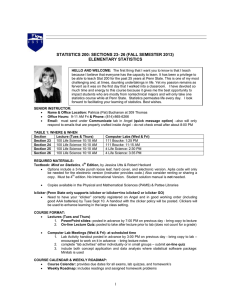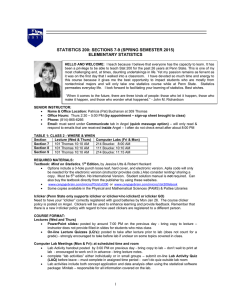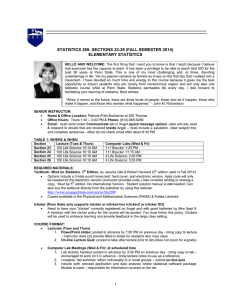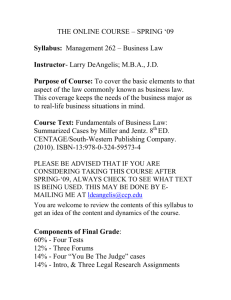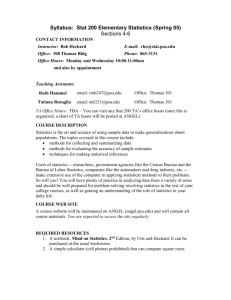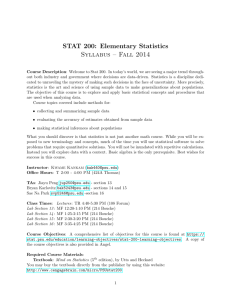IST-110 Syllabus - Penn State Department of Statistics
advertisement
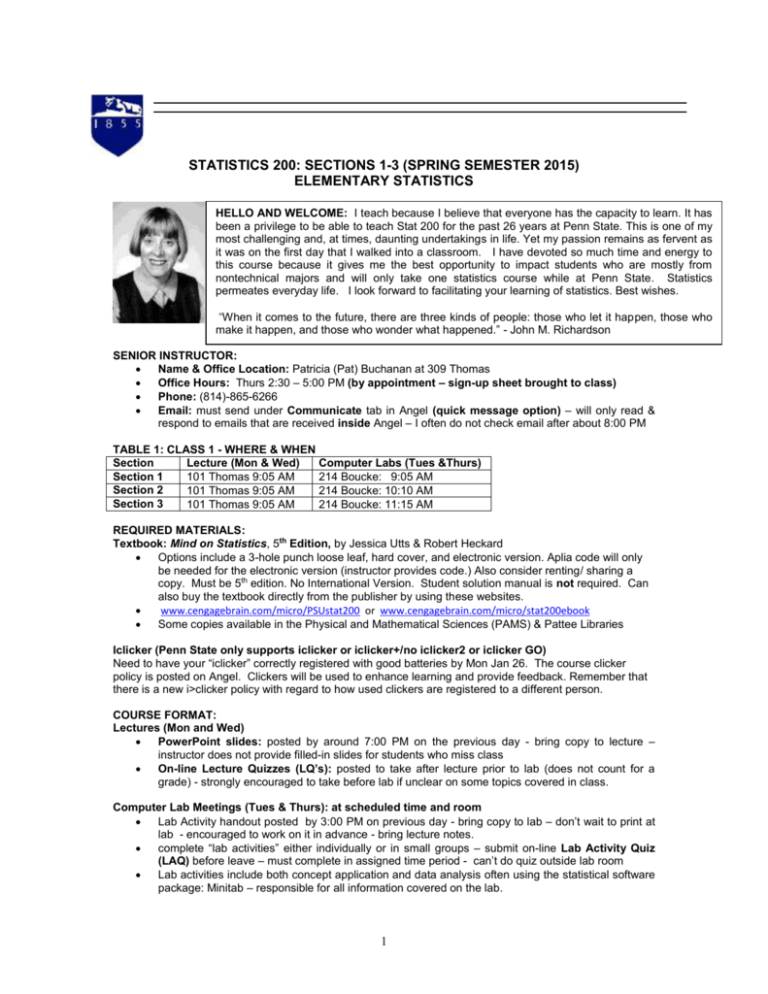
STATISTICS 200: SECTIONS 1-3 (SPRING SEMESTER 2015) ELEMENTARY STATISTICS HELLO AND WELCOME: I teach because I believe that everyone has the capacity to learn. It has been a privilege to be able to teach Stat 200 for the past 26 years at Penn State. This is one of my most challenging and, at times, daunting undertakings in life. Yet my passion remains as fervent as it was on the first day that I walked into a classroom. I have devoted so much time and energy to this course because it gives me the best opportunity to impact students who are mostly from nontechnical majors and will only take one statistics course while at Penn State. Statistics permeates everyday life. I look forward to facilitating your learning of statistics. Best wishes. “When it comes to the future, there are three kinds of people: those who let it happen, those who make it happen, and those who wonder what happened.” - John M. Richardson SENIOR INSTRUCTOR: Name & Office Location: Patricia (Pat) Buchanan at 309 Thomas Office Hours: Thurs 2:30 – 5:00 PM (by appointment – sign-up sheet brought to class) Phone: (814)-865-6266 Email: must send under Communicate tab in Angel (quick message option) – will only read & respond to emails that are received inside Angel – I often do not check email after about 8:00 PM TABLE 1: CLASS 1 - WHERE & WHEN Section Lecture (Mon & Wed) Computer Labs (Tues &Thurs) Section 1 101 Thomas 9:05 AM 214 Boucke: 9:05 AM Section 2 101 Thomas 9:05 AM 214 Boucke: 10:10 AM Section 3 101 Thomas 9:05 AM 214 Boucke: 11:15 AM REQUIRED MATERIALS: Textbook: Mind on Statistics, 5th Edition, by Jessica Utts & Robert Heckard Options include a 3-hole punch loose leaf, hard cover, and electronic version. Aplia code will only be needed for the electronic version (instructor provides code.) Also consider renting/ sharing a copy. Must be 5th edition. No International Version. Student solution manual is not required. Can also buy the textbook directly from the publisher by using these websites. www.cengagebrain.com/micro/PSUstat200 or www.cengagebrain.com/micro/stat200ebook Some copies available in the Physical and Mathematical Sciences (PAMS) & Pattee Libraries Iclicker (Penn State only supports iclicker or iclicker+/no iclicker2 or iclicker GO) Need to have your “iclicker” correctly registered with good batteries by Mon Jan 26. The course clicker policy is posted on Angel. Clickers will be used to enhance learning and provide feedback. Remember that there is a new i>clicker policy with regard to how used clickers are registered to a different person. COURSE FORMAT: Lectures (Mon and Wed) PowerPoint slides: posted by around 7:00 PM on the previous day - bring copy to lecture – instructor does not provide filled-in slides for students who miss class On-line Lecture Quizzes (LQ’s): posted to take after lecture prior to lab (does not count for a grade) - strongly encouraged to take before lab if unclear on some topics covered in class. Computer Lab Meetings (Tues & Thurs): at scheduled time and room Lab Activity handout posted by 3:00 PM on previous day - bring copy to lab – don’t wait to print at lab - encouraged to work on it in advance - bring lecture notes. complete “lab activities” either individually or in small groups – submit on-line Lab Activity Quiz (LAQ) before leave – must complete in assigned time period - can’t do quiz outside lab room Lab activities include both concept application and data analysis often using the statistical software package: Minitab – responsible for all information covered on the lab. 1 COURSE WEB SITE (ANGEL): https://cms.psu.edu: On the Angel web site, you will find: Syllabus, Course Calendar, Weekly Roadmaps, Grade Book, Exam Study Guides, Lecture quizzes Lab activity quizzes & Homework’s quizzes (also available at a later time for practice) Power point slides (bring to lectures) & Lab activity handouts (bring to lab) Announcements & email correspondence (check Angel email daily during the week) Course Learning Goals (Common Final will include a question from each learning goal) COURSE CALENDAR & WEEKLY ROADMAP: Course Calendar: provides dates for all exams, lab quizzes, & homework’s for the entire semester Weekly Roadmap: includes readings and assigned homework problems, etc. GRADES IN ANGEL GRADE BOOK (Angel does not loose grades): based on points (not percent’s) - select “grades” with category under Repots assessments linked to the grade book will show a grade a “0” until a submission is made COURSE OVERVIEW: In today’s world, we find “big data” driving decisions made in every aspect of life. Statistics is a discipline dedicated to unraveling the mystery of making such decisions when faced with uncertainty. More precisely, statistics is the art and science of using sample data to make generalizations about populations. The objective of this course is to explore and apply basic statistical concepts and procedures that are used when analyzing data. What you should discover is that statistics is not just another math course. While you will be exposed to new terminology and concepts, much of the time you will use statistical software to solve problems that require quantitative solutions. Math is said to be the language for communication with both science and much of the social sciences. Statistics provides the structure for this communication. You will not be inundated with repetitive calculations but instead will explore data with a context. Basic algebra is the only prerequisite. The second part of the course is more technical. Success in this course requires an ability to apply reasoning skills over memorization. Additionally, you will need to integrate new material with previously-learned material throughout the semester. You are strongly encouraged to read newspapers where you can see how statistics can be applied to every-day life. COURSE GOALS: The two overarching goals are to: 1. understand the scientific method from a statistical perspective be able to identify questions, collect evidence, discover and apply tools needed to interpret the data, and communicate results. While you may never conduct a scientific study, it is still possible that you may encounter data or statistical results over the course of a career. 2. become good “statistical” citizens be able to: examine the information that you are inundated with, think critically about it, and then use it to make good decisions TEACHING ASSISTANTS (TA’s): will ___ oversee the computer lab meetings work with a team of graduate students who will hold shared office hours respond to emails received inside Angel LEARNING ASSISISSANTS (LA’s): undergraduate students who are statistics majors (or in a closely related major) will be also help in the computer lab meetings are not available for help outside the computer lab meetings HELP OPTIONS (FREE): Shared Office Hours (SOH) Location: 220D Boucke & Dates: (Tues Jan 20 – Thurs Apr 30) Conducted by a pool of graduate students from the statistics department Hours will be: (1-4 pm & 6-9 pm on Mon thru Wed) & (1-3 pm & 6-9 pm on Thurs) Guided Study Groups (Through Penn State Learning) More info at https://pennstatelearning.psu.edu/study-groups (Start week of Jan 25) 2 COURSE AGREEMENT: This syllabus serves as an agreement that begins on the first day of class & ends upon completion of the final exam. With this course, you need to accept that: 1. this is an in-residence course – can’t disappear for days/weeks expecting to make-up work 2. final grades are: earned based on mastery of material (not on attendance or negotiations) - not changed for financial aid and/or academic progress purposes. (also not curved or rounded) - individual extra credit will not be allowed either during or after the end of the semester 3. during class cell phones should be put away as a matter of respect to the instructor/students 4. lab activities (LAQ’s) must be completed during the scheduled time in the assigned lab room 5. all exams, including the final, must be taken at the scheduled time (can’t take early) 6. you must sign up for exams and follow all rules when using the Computerized Testing Center 7. your iclicker must be: correctly registered & properly working (including good batteries) 8. instructor does not answer questions about grade calculations or clicker issues by email 9. you must seek immediate help if having problems 10. the instructor & TA’s do not provide answers/solutions to problems developed by external money-making sources such as Lion Tutors, Nittany Notes etc. (don’t spend money on this) 11. you must submit your own work – don’t just copy from classmates use Angel: 1. with an acceptable browser and fully functioning internet connection 2. to send email: http://kb.its.psu.edu/cms/article/383 under the “Quick Message” option (no response to emails received outside Angel) with an acceptable greeting (includes name), complete sentences, clear subject line & class identification by lecture time 3. to regularly check: the grade book right after making a submission or posting (can’t report problems days/weeks/months later) - Angel does not lose grades all posted materials and emails come to class: at scheduled start time and willing to make the appropriate commitment COURSE ASSESSMENTS Exams: (4 exams will be given/no drops) – can’t take early each will include 40 multiple choice questions (60 minutes) take at Computerized Testing Center (104 Pollock) on scheduled date & time ( sign up in advance) topics will carry over from previous exams because of integration of course material some exam questions will come from homework, along with extra problems listed from the textbook provided a piece of scratch paper at exam (bring your own pencil/pen) – some helpful information is embedded – nothing else allowed such as a calculator, cellphone, notes, Bluetooth watch, etc. must follow the Testing Center policies – failure to do so will results in a “0” for the exam evidence can come from witnesses, security cameras and computer records Final Exam: comprehensive (about 45 questions) / (1/2 of questions come from a common test bank) must take on scheduled date & time (schedule posted on Elion - Mon Feb 16) – can’t take early must follow same rules and procedures as found with exams Homework (HW): keep best 8 out of 9 scores* questions will come from the textbook (problems listed on Weekly Roadmap) – similar problems will be listed for practice (answers in back of textbook) will be submitted inside Angel by a scheduled time and date (quiz format) – 30 minutes can take twice (best score will count) – will be open on Thurs 1:00 PM – open for 48 hours can’t submit late and no adjustments for computer problems (don’t wait until last minute) Lab Activity Quizzes (LAQ): keep best 20 out of 24 scores* take using Angel after completing each lab activity - 20 minutes consist of about 20 questions based on concepts covered in lectures and lab activities must take in Boucke lab during scheduled lab time (one try only) Clicker Points: keep all three scores* detailed handout of policy and procedures will be is posted (must follow) 3 Pretest (Attitudes and Knowledge): Must take in lab on Tues Jan 13 during scheduled lab time if at least 85% of the class completes, with a good faith effort, everyone who takes will receive 5 extra credit points - grade won’t immediately appear in Angel Gradebook Pretest (Check Math Skills): Thurs Jan 15 – Fri Jan 23 (except for the weekend & MLK holiday) take at the Computerized Testing Center (104 Pollock) – 30 minutes (sign up in advance) goal: provide the instructor with background information about math skills – only allowed pen/pencil will receive extra credit points for every correct answer (no-make-ups) – 5 points max Posttest (Attitudes and Knowledge): Must take in lab on Thurs Apr 30 during scheduled lab time if at least 85% of the class completes, with a good faith effort, everyone who takes will receive 5 extra credit points – grade won’t immediately appear in the Angel Gradebook Posttest (Final Prep): Thurs Apr 30 or Fri May 1 take at the Computerized Testing Center (104 Pollock) – 30 minutes some possible extra credit points when answer correctly - only allowed pe/pencil provides adjustments to off-set policies found with a large enrollment courses MAKE-UP POLICY: Lab Activity Quizzes & Homework Quizzes: no make-ups under most circumstances – the course is front-loaded with drops IMPORTANT: with LAQ’s: everyone must use two drops (no exceptions) when sick, attend funerals, at court, family issues, personal problems, missed the bus, weather, transportation issues Do not come to class if you are sick. Masks are available at University Health Services. extended illness/problems will be dealt with on an individual basis quizzes will be available for practice after all students have submitted class will be held the entire week of March 2 and on both Thurs Apr 2 and Mon Apr 6. make-ups will not be granted to students who are not regularly participating in the class Exams: only allowed if you have a University-related excuse or a religious conflict, you must talk to the instructor in person and provide documentation with appropriate letterhead and signatures, prior to the exam for arrangements. illnesses will be dealt with on an individual basis. All exams will be available for review after all students have submitted – contacting the instructor after the exam date is not acceptable make-ups will not be granted to students who are not regularly participating in the class PENN STATE The Pennsylvania State University is a community dedicated to personal and academic excellence. The Penn State Principles were developed to embody the values that we hope our students, faculty, staff, administration, and alumni possess. The expectations for a vibrant learning environment include: practicing academic integrity owning individual responsibility for your academic progress maintaining social and personal responsibility respecting the dignity of everyone in the Penn State community ACADEMIC INTEGRITY: Academic integrity includes a commitment to not engage in or tolerate acts of falsification, misrepresentation or deception. Such acts of dishonesty violate the fundamental ethical principles of the Penn State community and compromise the worth of work completed by others. This course will follow the Eberly College of Science policy at http://science.psu.edu/current-students/Integrity/Policy.html DISABILITY POLICY: “Penn State welcomes students with disabilities into the University's educational programs. If you have a disability-related need for reasonable academic adjustments in this course, contact the Office for Disability Services (ODS) at 814-863-1807 (V/TTY), at 116 Boucke. For further information regarding ODS, please visit the Office for Disability Services Web site at http://equity.psu.edu/ods/. In order to receive consideration for course accommodations, you must contact ODS and provide documentation (see the documentation guidelines at http://equity.psu.edu/ods/guidelines/documentation-guidelines). Homework Quizzes & LAQ’s have already been adjusted to accommodate those who need additional time. 4 TABLE 2: SUMMARY OF COURSE ASSESSMENTS Assessment Exams: Exam 1: Fri Feb 6 Exam 2: Fri Feb 27 Exam 3: Fri Mar 27 Exam 4: Fri Apr 24 Final Exam (must take during scheduled time) Lab Activity Quizzes (LAQ) - keep best 20 of 24 Homework (HW) - keep best 8 of 9 Clicker Scores - 3 scores Total Pts/Effort 100 Overall Pts 400 Overall Percent (%) 40% 250 10 12 18 250 200 96 54 1000 25% 20% 9.6% 5.4% 100% FINAL GRADES: based on 1000 points most importantly, grades are earned based on academic performance point ranges for final grades are found in Table 3. grade boundaries must be set so that student performances can be fairly evaluated do not expect the grades to be curved (also cannot negotiate your grade or missed assignments at the end of or after the semester is over). - will not be rounded. For example, a point total of 929.99 will be an A- grade, while a point total of 699.99 will be a D grade. extra credit options are available to off-set policies that must exist with large enrollment classes TABLE 3: POINT BOUNDARIES FOR FINAL GRADES Final Grade Minimum Points Needed* A 930 points A900 points B+ 870 points B 830 points B800 points C+ 770 points C 700 points D 600 points F 0 points TABLE 4: CHAPTERS COVERED & CORRESPONDING TOPICS* Chapters Topics Chapter 1 (all sections) Overview of Statistics, Population, Sample, & Statistical Principles Chapter 2 (all sections) Descriptive Methods: (one quantitative) & (one categorical) variable Chapter 3: (all sections) Descriptive Methods: Regression & Correlation Chapter 4: Sections 4.1 – 4.4 Chi-square Procedure: 2X2 tables (also relative risk, increased risk, odds, etc.) Chapter 5: Sections 5.1-5.3 Margin of error, polls, confidence interval, simple random sample Chapter 6: Sections 6.1-6.3 Design of “Randomized Experiments” &” Observational Studies” Chapter 7: Sections 7.1- 7.4, 7.7 Probability Interpretation, Rules & Flawed Intuitive Judgments Chapter 8: Sections 8.1- 8.7 Random variables, Binomial distribution, & Normal distribution Chapter 9: Sections 9.1- 9.4, 9.6, 9.9- Sampling Distributions, Central Limit Theorem 9.10 Chapter 10: (all sections) Confidence Intervals: Population Proportion(s) Chapter 11: Sections 11.1 – 11.5 Confidence Intervals: Population Mean(s) Chapter 12: Sections (all sections) Hypothesis Tests: Population Proportion(s) Chapter 13: Sections 13.1 – 13.6 Hypotheses Tests: Population Mean(s) Chapter 14: Sections 14.3 Hypothesis tests: Population Correlation & Population Slope tests Chapter 15: Sections 15.1 & 15.2 Chi-square Tests: larger than 2X2 tables Pages 511, 514 in textbook Nonparametrics (Population Median) - when to use *Not all chapters will be covered in the order found in the textbook. LETTERS OF RECOMMENDATION: Will only consider writing one for students who: get to know me through several interactions (so that I can discover things to put in the letter) have final grade of at least a B+ when given 4-6 week advanced notice 5 Some Helpful Tips Provided By Previous Students: 1. Pay attention in class - and always ask if you do not understand something. It’s better to ask than to no know at all 2. Doing the lecture quizzes and optional homework is definitely what contributed to me getting over 100% in the course, 3. Come to class. Take notes firstly, and then spend more time on reviewing. Convert the lecture "words" into your own understanding 4. Do lecture practice quizzes soon after the lecture to reinforce the material you just learned. It helps to remember the information if you process it more often. 5. Be sure to constantly review notes and consult your teacher as soon as any problems occur. Since this course constantly builds upon itself, getting lost early on makes material confusing. Be sure to review, make flow charts and also meet with the TA; s. 6. Take LAQ’s and homework’s seriously – do practice quizzes – great study tool 7. Go to class every day, don't fall behind. 8. Do the practices offered on Angel, and keep up with classwork. Find people to work with and help each other out! 9. Come to all classes, so you will know the entire subject for the tests. Also, if it is possible, do all homework and Labs. Print the slides, labs, and read the chapter before classes also is a helpful tip. 10. Study the notes every day and redo all the lecture quizzes and lab quizzes 11. Follow along attentively in class. Do all homework’s and attend class regularly. 12. Use all the practice quizzes – listen in lecture and take good notes 13. I would recommend you to understand how all the material fits together, instead of just its individual components. Also to go consult the TA and other people in the class with questions. Definitely come to class and take the labs seriously because they help to solidify the information that you have learned in class. Attend and pay attention in class. Chinese Proverb Tell me and I'll forget; show me and I may remember; involve me and I'll understand. 6
